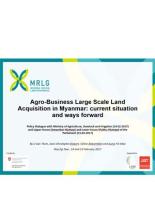Land Library
Welcome to the Land Portal Library. Explore our vast collection of open-access resources (over 74,000) including reports, journal articles, research papers, peer-reviewed publications, legal documents, videos and much more.
/ library resources
Showing items 1 through 9 of 11.This presentation summarizes an on-going research in Myanmar, carried out by renowned agricultural specialist U San Thein and a team of experts, with the support of MRLG.
¿Qué comemos?, Donde comemos, con quien comemos? Como y quien ha cultivado, criado, elaborado y cocinado lo que comemos? Las respuestas a estas preguntas definen una cultura, una sociedad una economía y un territorio.
Un estudio de la FAUBA analizó el impacto de la agriculturización no sólo en términos socio económicos, sino también desde la transmisión de saberes entre generaciones y el rol de las mujeres en el campo.
As the Ministry of Agriculture, Forestry, Fisheries (MAFF) aimed to finalize in the end of 2016 the draft law on agricultural lands that is currently in 6th draft, MRLG, together with other partners, has supported the NGO Forum on Cambodia to mobilize representatives of farmer organizations and C
This short video examines an initiative by Earth Systems to develop a tea sector dialogue platform that brings together key stakeholders in the value chain to jointly examine challenges and opportunities for the development of a more equitable and sustainable tea sector in Laos.
This country level analysis addresses land governance in Viet Nam in two ways.
Protected area management is threatened by weak articulation between the goals for conservation, national development and local livelihoods. This discussion note examines the competing interests for lands inside Cambodian Protected Areas and makes suggestions for policy considerations.
La comunidad de Monseñor Romero se encuentra en la zona costera de Guatemala, región acaparada por los monocultivos de caña de azúcar, banano y palma africana.
La agricultura tiene un bajo rendimiento en muchos países en desarrollo por varias razones. Entre ellas está el hecho de que las mujeres carecen de los recursos y oportunidades que necesitan para rentabilizar al máximo el uso de su tiempo.






